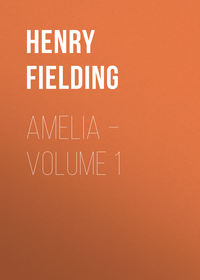 полная версия
полная версияAmelia – Complete
“What, madam?” cries Booth; “if I can give you any satisfaction – ”
“No, no,” said she, “I must hear all; I would not for the world break the thread of your story. Besides, I am afraid to ask – Pray, pray, sir, go on.”
“Well, madam,” cries Booth, “I think I was mentioning the extraordinary acts of friendship done me by Captain James; nor can I help taking notice of the almost unparalleled fidelity of poor Atkinson (for that was my man’s name), who was not only constant in the assiduity of his attendance, but during the time of my danger demonstrated a concern for me which I can hardly account for, as my prevailing on his captain to make him a sergeant was the first favour he ever received at my hands, and this did not happen till I was almost perfectly recovered of my broken leg. Poor fellow! I shall never forget the extravagant joy his halbert gave him; I remember it the more because it was one of the happiest days of my own life; for it was upon this day that I received a letter from my dear Amelia, after a long silence, acquainting me that she was out of all danger from her lying-in.
“I was now once more able to perform my duty; when (so unkind was the fortune of war), the second time I mounted the guard, I received a violent contusion from the bursting of a bomb. I was felled to the ground, where I lay breathless by the blow, till honest Atkinson came to my assistance, and conveyed me to my room, where a surgeon immediately attended me.
“The injury I had now received was much more dangerous in my surgeon’s opinion than the former; it caused me to spit blood, and was attended with a fever, and other bad symptoms; so that very fatal consequences were apprehended.
“In this situation, the image of my Amelia haunted me day and night; and the apprehensions of never seeing her more were so intolerable, that I had thoughts of resigning my commission, and returning home, weak as I was, that I might have, at least, the satisfaction of dying in the arms of my love. Captain James, however, persisted in dissuading me from any such resolution. He told me my honour was too much concerned, attempted to raise my hopes of recovery to the utmost of his power; but chiefly he prevailed on me by suggesting that, if the worst which I apprehended should happen, it was much better for Amelia that she should be absent than present in so melancholy an hour. ‘I know’ cried he, ‘the extreme joy which must arise in you from meeting again with Amelia, and the comfort of expiring in her arms; but consider what she herself must endure upon the dreadful occasion, and you would not wish to purchase any happiness at the price of so much pain to her.’ This argument at length prevailed on me; and it was after many long debates resolved, that she should not even know my present condition, till my doom either for life or death was absolutely fixed.”
“Oh! Heavens! how great! how generous!” cried Miss Matthews. “Booth, thou art a noble fellow; and I scarce think there is a woman upon earth worthy so exalted a passion.”
Booth made a modest answer to the compliment which Miss Matthews had paid him. This drew more civilities from the lady, and these again more acknowledgments; all which we shall pass by, and proceed with our history.
Chapter vi. – Containing matters which will please some readers
“Two months and more had I continued in a state of incertainty, sometimes with more flattering, and sometimes with more alarming symptoms; when one afternoon poor Atkinson came running into my room, all pale and out of breath, and begged me not to be surprized at his news. I asked him eagerly what was the matter, and if it was anything concerning Amelia? I had scarce uttered the dear name when she herself rushed into the room, and ran hastily to me, crying, ‘Yes, it is, it is your Amelia herself.’
“There is nothing so difficult to describe, and generally so dull when described, as scenes of excessive tenderness.”
“Can you think so?” says Miss Matthews; “surely there is nothing so charming! – Oh! Mr. Booth, our sex is d – ned by the want of tenderness in yours. O, were they all like you – certainly no man was ever your equal.”
“Indeed, madam,” cries Booth, “you honour me too much. But – well – when the first transports of our meeting were over, Amelia began gently to chide me for having concealed my illness from her; for, in three letters which I had writ her since the accident had happened, there was not the least mention of it, or any hint given by which she could possibly conclude I was otherwise than in perfect health. And when I had excused myself, by assigning the true reason, she cried – ‘O Mr. Booth! and do you know so little of your Amelia as to think I could or would survive you? Would it not be better for one dreadful sight to break my heart all at once than to break it by degrees? – O Billy! can anything pay me for the loss of this embrace?’ – But I ask your pardon – how ridiculous doth my fondness appear in your eyes!”
“How often,” answered she, “shall I assert the contrary? What would you have me say, Mr. Booth? Shall I tell you I envy Mrs. Booth of all the women in the world? would you believe me if I did? I hope you – what am I saying? Pray make no farther apology, but go on.”
“After a scene,” continued he, “too tender to be conceived by many, Amelia informed me that she had received a letter from an unknown hand, acquainting her with my misfortune, and advising her, if she ever desired to see me more, to come directly to Gibraltar. She said she should not have delayed a moment after receiving this letter, had not the same ship brought her one from me written with rather more than usual gaiety, and in which there was not the least mention of my indisposition. This, she said, greatly puzzled her and her mother, and the worthy divine endeavoured to persuade her to give credit to my letter, and to impute the other to a species of wit with which the world greatly abounds. This consists entirely in doing various kinds of mischief to our fellow-creatures, by belying one, deceiving another, exposing a third, and drawing in a fourth, to expose himself; in short, by making some the objects of laughter, others of contempt; and indeed not seldom by subjecting them to very great inconveniences, perhaps to ruin, for the sake of a jest.
“Mrs. Harris and the doctor derived the letter from this species of wit. Miss Betty, however, was of a different opinion, and advised poor Amelia to apply to an officer whom the governor had sent over in the same ship, by whom the report of my illness was so strongly confirmed, that Amelia immediately resolved on her voyage.
“I had a great curiosity to know the author of this letter, but not the least trace of it could be discovered. The only person with whom I lived in any great intimacy was Captain James, and he, madam, from what I have already told you, you will think to be the last person I could suspect; besides, he declared upon his honour that he knew nothing of the matter, and no man’s honour is, I believe, more sacred. There was indeed an ensign of another regiment who knew my wife, and who had sometimes visited me in my illness; but he was a very unlikely man to interest himself much in any affairs which did not concern him; and he too declared he knew nothing of it.”
“And did you never discover this secret?” cried Miss Matthews.
“Never to this day,” answered Booth.
“I fancy,” said she, “I could give a shrewd guess. What so likely as that Mrs. Booth, when you left her, should have given her foster-brother orders to send her word of whatever befel you? Yet stay – that could not be neither; for then she would not have doubted whether she should leave dear England on the receipt of the letter. No, it must have been by some other means; – yet that I own appeared extremely natural to me; for if I had been left by such a husband I think I should have pursued the same method.”
“No, madam,” cried Booth, “it must have been conveyed by some other channel; for my Amelia, I am certain, was entirely ignorant of the manner; and as for poor Atkinson, I am convinced he would not have ventured to take such a step without acquainting me. Besides, the poor fellow had, I believe, such a regard for my wife, out of gratitude for the favours she hath done his mother, that I make no doubt he was highly rejoiced at her absence from my melancholy scene. Well, whoever writ it is a matter very immaterial; yet, as it seemed so odd and unaccountable an incident, I could not help mentioning it.
“From the time of Amelia’s arrival nothing remarkable happened till my perfect recovery, unless I should observe her remarkable behaviour, so full of care and tenderness, that it was perhaps without a parallel.”
“O no, Mr. Booth,” cries the lady; “it is fully equalled, I am sure, by your gratitude. There is nothing, I believe, so rare as gratitude in your sex, especially in husbands. So kind a remembrance is, indeed, more than a return to such an obligation; for where is the mighty obligation which a woman confers, who being possessed of an inestimable jewel, is so kind to herself as to be careful and tender of it? I do not say this to lessen your opinion of Mrs. Booth. I have no doubt but that she loves you as well as she is capable. But I would not have you think so meanly of our sex as to imagine there are not a thousand women susceptible of true tenderness towards a meritorious man. Believe me, Mr. Booth, if I had received such an account of an accident having happened to such a husband, a mother and a parson would not have held me a moment. I should have leapt into the first fishing-boat I could have found, and bid defiance to the winds and waves. – Oh! there is no true tenderness but in a woman of spirit. I would not be understood all this while to reflect on Mrs. Booth. I am only defending the cause of my sex; for, upon my soul, such compliments to a wife are a satire on all the rest of womankind.”
“Sure you jest, Miss Matthews,” answered Booth with a smile; “however, if you please, I will proceed in my story.”
Chapter vii. – The captain, continuing his story, recounts some particulars which, we doubt not, to many good people, will appear unnatural
I was scarce sooner recovered from my indisposition than Amelia herself fell ill. This, I am afraid, was occasioned by the fatigues which I could not prevent her from undergoing on my account; for, as my disease went off with violent sweats, during which the surgeon strictly ordered that I should lie by myself, my Amelia could not be prevailed upon to spend many hours in her own bed. During my restless fits she would sometimes read to me several hours together; indeed it was not without difficulty that she ever quitted my bedside. These fatigues, added to the uneasiness of her mind, overpowered her weak spirits, and threw her into one of the worst disorders that can possibly attend a woman; a disorder very common among the ladies, and our physicians have not agreed upon its name. Some call it fever on the spirits, some a nervous fever, some the vapours, and some the hysterics.
“O say no more,” cries Miss Matthews; “I pity you, I pity you from my soul. A man had better be plagued with all the curses of Egypt than with a vapourish wife.”
“Pity me! madam,” answered Booth; “pity rather that dear creature who, from her love and care of my unworthy self, contracted a distemper, the horrors of which are scarce to be imagined. It is, indeed, a sort of complication of all diseases together, with almost madness added to them. In this situation, the siege being at an end, the governor gave me leave to attend my wife to Montpelier, the air of which was judged to be most likely to restore her to health. Upon this occasion she wrote to her mother to desire a remittance, and set forth the melancholy condition of her health, and her necessity for money, in such terms as would have touched any bosom not void of humanity, though a stranger to the unhappy sufferer. Her sister answered it, and I believe I have a copy of the answer in my pocket. I keep it by me as a curiosity, and you would think it more so could I shew you my Amelia’s letter.” He then searched his pocket-book, and finding the letter among many others, he read it in the following words:
“‘DEAR SISTER, – My mamma being much disordered, hath commanded me to tell you she is both shocked and surprized at your extraordinary request, or, as she chuses to call it, order for money. You know, my dear, she says that your marriage with this red-coat man was entirely against her consent and the opinion of all your family (I am sure I may here include myself in that number); and yet, after this fatal act of disobedience, she was prevailed on to receive you as her child; not, however, nor are you so to understand it, as the favourite which you was before. She forgave you; but this was as a Christian and a parent; still preserving in her own mind a just sense of your disobedience, and a just resentment on that account. And yet, notwithstanding this resentment, she desires you to remember that, when you a second time ventured to oppose her authority, and nothing would serve you but taking a ramble (an indecent one, I can’t help saying) after your fellow, she thought fit to shew the excess of a mother’s tenderness, and furnished you with no less than fifty pounds for your foolish voyage. How can she, then, be otherwise than surprized at your present demand? which, should she be so weak to comply with, she must expect to be every month repeated, in order to supply the extravagance of a young rakish officer. You say she will compassionate your sufferings; yes, surely she doth greatly compassionate them, and so do I too, though you was neither so kind nor so civil as to suppose I should. But I forgive all your slights to me, as well now as formerly. Nay, I not only forgive, but I pray daily for you. But, dear sister, what could you expect less than what hath happened? you should have believed your friends, who were wiser and older than you. I do not here mean myself, though I own I am eleven months and some odd weeks your superior; though, had I been younger, I might, perhaps, have been able to advise you; for wisdom and what some may call beauty do not always go together. You will not be offended at this; for I know in your heart, you have always held your head above some people, whom, perhaps, other people have thought better of; but why do I mention what I scorn so much? No, my dear sister, Heaven forbid it should ever be said of me that I value myself upon my face – not but if I could believe men perhaps – but I hate and despise men – you know I do, my dear, and I wish you had despised them as much; but jacta est jalea, as the doctor says. You are to make the best of your fortune – what fortune, I mean, my mamma may please to give you, for you know all is in her power. Let me advise you, then, to bring your mind to your circumstances, and remember (for I can’t help writing it, as it is for your own good) the vapours are a distemper which very ill become a knapsack. Remember, my dear, what you have done; remember what my mamma hath done; remember we have something of yours to keep, and do not consider yourself as an only child; no, nor as a favourite child; but be pleased to remember, Dear sister, Your most affectionate sister,
“‘and most obedient humble servant,
“‘E. HARRIS.’”
“O brave Miss Betty!” cried Miss Matthews; “I always held her in high esteem; but I protest she exceeds even what I could have expected from her.”
“This letter, madam,” cries Booth, “you will believe, was an excellent cordial for my poor wife’s spirits. So dreadful indeed was the effect it had upon her, that, as she had read it in my absence, I found her, at my return home, in the most violent fits; and so long was it before she recovered her senses, that I despaired of that blest event ever happening; and my own senses very narrowly escaped from being sacrificed to my despair. However, she came at last to herself, and I began to consider of every means of carrying her immediately to Montpelier, which was now become much more necessary than before.
“Though I was greatly shocked at the barbarity of the letter, yet I apprehended no very ill consequence from it; for, as it was believed all over the army that I had married a great fortune, I had received offers of money, if I wanted it, from more than one. Indeed, I might have easily carried my wife to Montpelier at any time; but she was extremely averse to the voyage, being desirous of our returning to England, as I had leave to do; and she grew daily so much better, that, had it not been for the receipt of that cursed – which I have just read to you, I am persuaded she might have been able to return to England in the next ship.
“Among others there was a colonel in the garrison who had not only offered but importuned me to receive money of him; I now, therefore, repaired to him; and, as a reason for altering my resolution, I produced the letter, and, at the same time, acquainted him with the true state of my affairs. The colonel read the letter, shook his head, and, after some silence, said he was sorry I had refused to accept his offer before; but that he had now so ordered matters, and disposed of his money, that he had not a shilling left to spare from his own occasions.
“Answers of the same kind I had from several others, but not one penny could I borrow of any; for I have been since firmly persuaded that the honest colonel was not content with denying me himself, but took effectual means, by spreading the secret I had so foolishly trusted him with, to prevent me from succeeding elsewhere; for such is the nature of men, that whoever denies himself to do you a favour is unwilling that it should be done to you by any other.
“This was the first time I had ever felt that distress which arises from the want of money; a distress very dreadful indeed in a married state; for what can be more miserable than to see anything necessary to the preservation of a beloved creature, and not be able to supply it?
“Perhaps you may wonder, madam, that I have not mentioned Captain James on this occasion; but he was at that time laid up at Algiers (whither he had been sent by the governor) in a fever. However, he returned time enough to supply me, which he did with the utmost readiness on the very first mention of my distress; and the good colonel, notwithstanding his having disposed of his money, discounted the captain’s draft. You see, madam, an instance in the generous behaviour of my friend James, how false are all universal satires against humankind. He is indeed one of the worthiest men the world ever produced.
“But, perhaps, you will be more pleased still with the extravagant generosity of my sergeant. The day before the return of Mr. James, the poor fellow came to me with tears in his eyes, and begged I would not be offended at what he was going to mention. He then pulled a purse from his pocket, which contained, he said, the sum of twelve pounds, and which he begged me to accept, crying, he was sorry it was not in his power to lend me whatever I wanted. I was so struck with this instance of generosity and friendship in such a person, that I gave him an opportunity of pressing me a second time before I made him an answer. Indeed, I was greatly surprised how he came to be worth that little sum, and no less at his being acquainted with my own wants. In both which points he presently satisfied me. As to the first, it seems he had plundered a Spanish officer of fifteen pistoles; and as to the second, he confessed he had it from my wife’s maid, who had overheard some discourse between her mistress and me. Indeed people, I believe, always deceive themselves, who imagine they can conceal distrest circumstances from their servants; for these are always extremely quicksighted on such occasions.”
“Good heavens!” cries Miss Matthews, “how astonishing is such behaviour in so low a fellow!”
“I thought so myself,” answered Booth; “and yet I know not, on a more strict examination into the matter, why we should be more surprised to see greatness of mind discover itself in one degree or rank of life than in another. Love, benevolence, or what you will please to call it, may be the reigning passion in a beggar as well as in a prince; and wherever it is, its energies will be the same.
“To confess the truth, I am afraid we often compliment what we call upper life, with too much injustice, at the expense of the lower. As it is no rare thing to see instances which degrade human nature in persons of the highest birth and education, so I apprehend that examples of whatever is really great and good have been sometimes found amongst those who have wanted all such advantages. In reality, palaces, I make no doubt, do sometimes contain nothing but dreariness and darkness, and the sun of righteousness hath shone forth with all its glory in a cottage.”
Chapter viii. – The story of Booth continued
“Mr. Booth thus went on:
“We now took leave of the garrison, and, having landed at Marseilles, arrived at Montpelier, without anything happening to us worth remembrance, except the extreme sea-sickness of poor Amelia; but I was afterwards well repaid for the terrors which it occasioned me by the good consequences which attended it; for I believe it contributed, even more than the air of Montpelier, to the perfect re-establishment of her health.”
“I ask your pardon for interrupting you,” cries Miss Matthews, “but you never satisfied me whether you took the sergeant’s money. You have made me half in love with that charming fellow.”
“How can you imagine, madam,” answered Booth, “I should have taken from a poor fellow what was of so little consequence to me, and at the same time of so much to him? Perhaps, now, you will derive this from the passion of pride.”
“Indeed,” says she, “I neither derive it from the passion of pride nor from the passion of folly: but methinks you should have accepted the offer, and I am convinced you hurt him very much when you refused it. But pray proceed in your story.” Then Booth went on as follows:
“As Amelia recovered her health and spirits daily, we began to pass our time very pleasantly at Montpelier; for the greatest enemy to the French will acknowledge that they are the best people in the world to live amongst for a little while. In some countries it is almost as easy to get a good estate as a good acquaintance. In England, particularly, acquaintance is of almost as slow growth as an oak; so that the age of man scarce suffices to bring it to any perfection, and families seldom contract any great intimacy till the third, or at least the second generation. So shy indeed are we English of letting a stranger into our houses, that one would imagine we regarded all such as thieves. Now the French are the very reverse. Being a stranger among them entitles you to the better place, and to the greater degree of civility; and if you wear but the appearance of a gentleman, they never suspect you are not one. Their friendship indeed seldom extends as far as their purse; nor is such friendship usual in other countries. To say the truth, politeness carries friendship far enough in the ordinary occasions of life, and those who want this accomplishment rarely make amends for it by their sincerity; for bluntness, or rather rudeness, as it commonly deserves to be called, is not always so much a mark of honesty as it is taken to be.
“The day after our arrival we became acquainted with Mons. Bagillard. He was a Frenchman of great wit and vivacity, with a greater share of learning than gentlemen are usually possessed of. As he lodged in the same house with us, we were immediately acquainted, and I liked his conversation so well that I never thought I had too much of his company. Indeed, I spent so much of my time with him, that Amelia (I know not whether I ought to mention it) grew uneasy at our familiarity, and complained of my being too little with her, from my violent fondness for my new acquaintance; for, our conversation turning chiefly upon books, and principally Latin ones (for we read several of the classics together), she could have but little entertainment by being with us. When my wife had once taken it into her head that she was deprived of my company by M. Bagillard, it was impossible to change her opinion; and, though I now spent more of my time with her than I had ever done before, she still grew more and more dissatisfied, till at last she very earnestly desired me to quit my lodgings, and insisted upon it with more vehemence than I had ever known her express before. To say the truth, if that excellent woman could ever be thought unreasonable, I thought she was so on this occasion.









